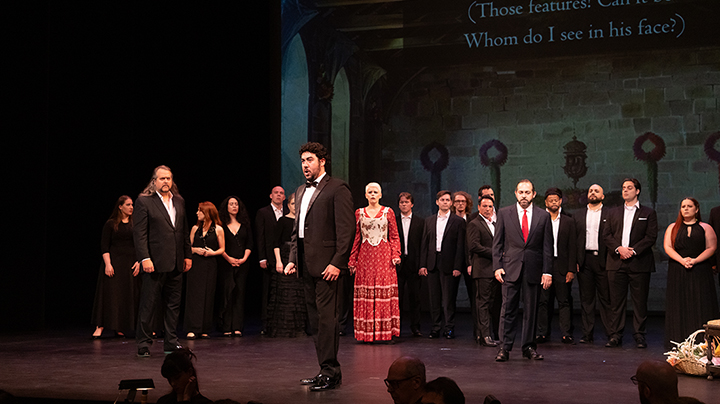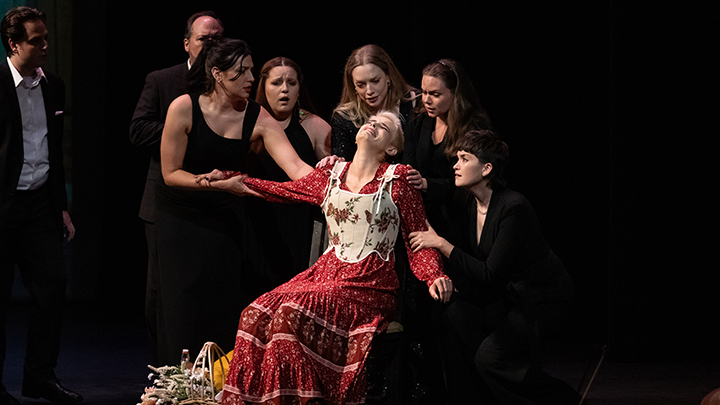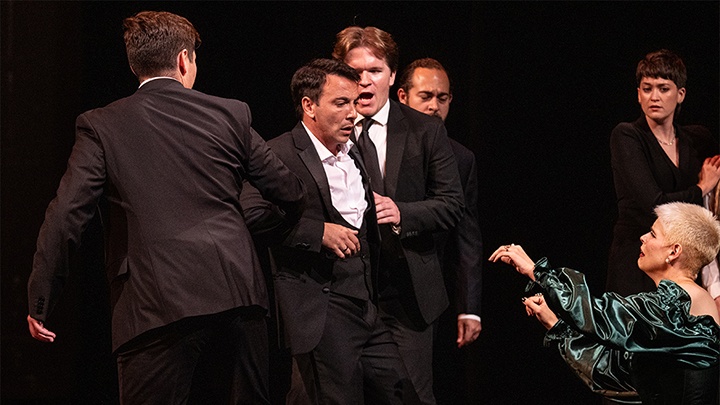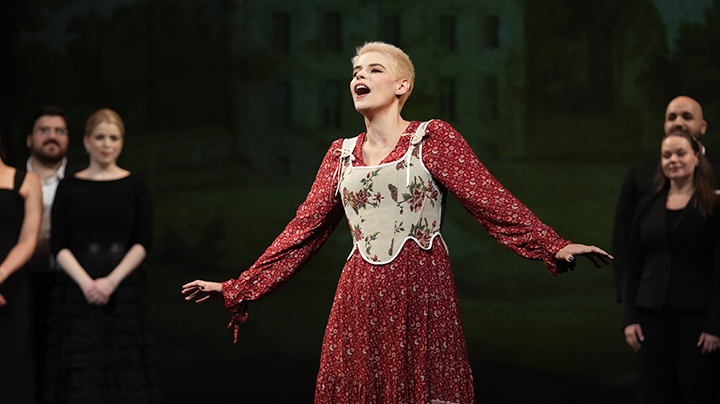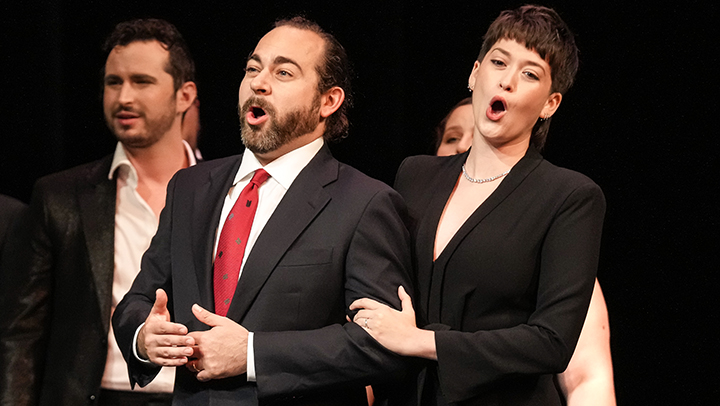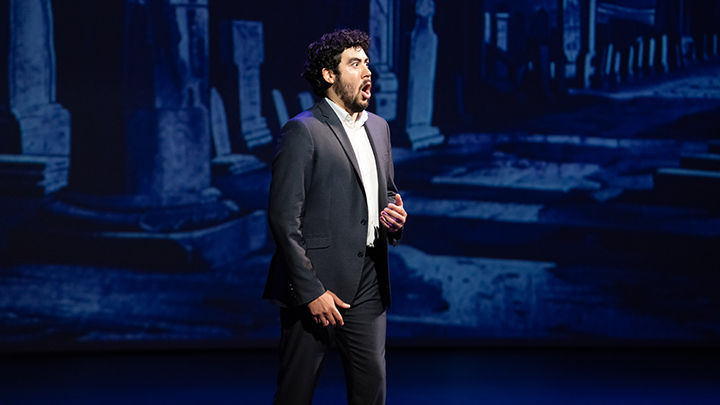I suspect she was irresistible, like a charming runaway coach. I suspect that when she wanted something, she buttonholed you and reasoned with you until you admitted she had every right to whatever it was she’d set her sights on. And she set her sights on the almost all-male preserve of bel canto laurels.
Write songs and perform them (and her piano variations on popular tunes of the day) at the most fashionable salons in Florence? Sure—she did that by the age of 17, in 1827. Marry a famous surgeon and have him introduce her to everyone she wanted to meet? Done before she was 20. Publish her songs and piano riffs? No problem. Get the leading singers of the day to sing her songs at the best soirees in Italy (there were no recordings, remember; a party needed music-makers), witty verses by herself, tunes savoring of Bellini and Rossini and, well, whoever was chic? She was on it.
At last, she wanted to compose an opera. Not just the tunes—she orchestrated the thing as well. And she invited Rossini and the grand old man, Giovanni Simone Mayr, to attend. And she got them to write letters about how good it was, and how good she was. And she made sure those letters were noticed. (That first opera, Samson, is unfortunately lost.)
A widow now, and with a daughter to raise (and join her in salon duets), she went to a foreign country where she knew no one—Naples—and got them to stage a grand opera she had just composed on fashionably Scottish themes. (Meyerbeer had already set it. Libretti were often re-used in the days before copyright.) When the libretto wasn’t quite revelatory enough, she wrote new scenes herself. She was a Jill of all trades.
Considering the opinion widely held of creative women at the time, Uccelli must have been twice as able as the average debutante composer to get herself heard and produced. And she had Fanny Tacchinardi, the top soprano in town, to create the title role: Anna di Resburgo. It was 1835—Bellini had just died and Donizetti had just written Lucia di Lammermoor for the same opera house with the same diva. So Uccelli aimed high, and with quality.
The lady sounds too good to be true, something feminist showrunners would invent and flesh out with fiction: a strong, brainy woman in the man’s world of Bel Canto Italy. Even Donizetti premiered 25 operas before he had a bona fide hit, Anna Bolena, but Uccelli, with barely an apprenticeship, was ready for action.
But after half a dozen performances, her last, and only surviving, grand opera vanished from the stage. Uccelli and her daughter sang at salons a few more years, and then she died, forgotten, not yet fifty. Her works were on lists, but her name was misspelled—it required Will Crutchfield with Teatro Nuovo (no surprise) and the current rage for forgotten female creatives to raise the lady from oblivion.
It was just bad luck that the same theater, the San Carlo, that premiered Anna di Resburgo had given the prima of Donizetti’s Lucia only a month earlier. Lucia, like Anna di Resburgo, is set in Walter Scott country, and concerns property claims and blood feuds, ending with a confrontation in a cemetery. Lucia is the bel canto era’s masterpiece, dramatically cast iron, memorably melodious, beloved of sopranos, tenors, baritones and even basses. Poor Anna can’t compete with that. Its last-minute happy ending doesn’t help.
But for lovers of bel canto, insatiable fans of sumptuous voices warbling (and ornamenting) intoxicating tunes, Anna di Resburgo is a delightful new kid on the block, even if she doesn’t stick around long. Uccelli’s original, somewhat untutored style is just the sort of thing Crutchfield adores. He has unearthed Anna di Resburgo from its long obscurity, crying like Poe’s Roderick Usher, “We have put her living into the tomb!” (Poe loved bel canto opera—you can tell, can’t you?)
As you expect if you are a Teatro Nuovo fan, the Maestro gave a chat from the keyboard before curtain time last Wednesday, about the wonders he had found within the score: the variant bass lines, the off-kilter funeral march, the climactic confrontational duet between the self-righteous soprano (accompanied by flute) and the guilt-ridden baritone (snare drum obbligato—a new idea to me, as to Crutchfield). The auditorium, of course, was packed for his talk.
The chat was preceded by a program of eight of Uccelli’s salon songs, performed by nine of Crutchfield’s able young pupils. Set to Uccelli’s own lyrics, the songs are sophisticated items, sentimental or jocose, savoring of their melodious bel canto contemporaries—but holding their own with those masters. If they turned up on a program with Rossini, Bellini or Mercadante, you would never raise a questioning eyebrow.
Then, in the Rose Theater, we had the New York premiere (preceded last weekend by the U.S. premiere, in Montclair) of Anna di Resburgo. The sets were projections, the staging minimal, the orchestra on original instruments, the conductor (Elisa Citterio) leading with her violin, as they did in orchestras of the time.
The story will strike a modern audience as incoherent. A Scottish laird has murdered his old friend and neighbor, throwing suspicion on the victim’s innocent son. The laird takes the property, but dies soon after, confessing his crime on his deathbed to his own son and heir, Norcesto, who becomes rich but uneasy. The appearance of unknown persons in town, who turn out to be the escaped father-slayer, Edemondo, his bride Anna (disguised as a harp-playing bard) and their child, left on somebody’s doorstep, does not ease Norcesto’s conscience. In the end, he cannot bring himself to profit from his father’s crime—he reveals the truth, and all ends happily.
This story provides opportunities for reflection and confrontation, but Uccelli is clumsy about laying it out. The opening scene, for two minor characters (Olfredo and his daughter Etelia), demands an awful lot of exposition, but Uccelli finds no tuneful way to handle it. Later there is a very long trio for the sole reason (as far as I could see) that three people are on stage, so no love duet is possible. There are several choruses, sung because, well, Scottish peasants have nothing better to do, right? Donizetti would have had them beating the bounds. Anna has a big aria because, well, she’s the prima donna (albeit disguised), but she hasn’t much to say—Olfredo and Etelia have already said it. And so on.
Act II is far more eventful. Anna confronts Norcesto and he weakens under her accusations. Their duet, plus Norcesto’s long aria of indecision and repentance, are the high points of the opera, original and impassioned—Anna gets a flute obbligato, but Norcesto’s accompaniment is a sinister snare drum, a striking contrast.
Edemondo is tried for parricide but off stage. We only hear about it because Olfredo describes the trial in the sort of patter that buffos specialized in—but Uccelli has composed it to deadly serious if agitated narration. Here, she made a virtue of a necessity—a local star buffo was singing Olfredo, and buffos sang patter in Naples, where opera buffa was invented. To use the comic method for tragic purposes shows an original theatrical mind on her part.
Chelsea Lehnea, who sang Paolina in Teatro Nuovo’s Poliuto last year, sang Anna di Resburgo with a healthy soprano that fails to achieve ideal bel canto evenness across the admittedly enormous range required of her. Her coloratura, too, was choppy, and occasional leaps from one part of her range to another hit dry patches. Perhaps she should sing middle Verdi that focuses on the well-schooled notes of her mid-range and tacks on some rare coloratura; a full bel canto heroine seems to give her undue stress. True, Anna is in a stressful situation, and her reckless defiance was well projected. Elisse Albian sang some very pretty phrases in the seconda donna role of Olfredo’s daughter, Etelia.
Argentine tenor Santiago Ballerini, a Crutchfield favorite, sang Edemondo, accused of parricide, bereaved husband, with a suave line and pleasing ornaments. He ducked a concluding high note (or that was my impression) but was much applauded anyway. The role is dramatically inert, and Uccelli couldn’t think of anything to do with it. Maybe a solitary prison scene full of self-recrimination would help.
Riccardo José Rivera, a Puerto Rican baritone, possessed, in guilt-ridden Norcesto, the most exciting music and the most turbulent dramatic situations in the opera, and his dark, liquid, theater-filling sound was ideal for it and drew the evening’s heartiest applause. His musical skill is matched by his dramatic instincts; he held the theater rapt during his long solo scenes, as well as matching Lehnea, bel canto snarl for bel canto snarl, during their furious duet. He sings lots of Donizetti and Verdi around the country, and that’s just what he should be doing—he has a fine, Renato Bruson-like line.
Lucas Levy sang the buffo role of Olfredo, the valued retainer, with a graceful basso, nicely articulated in the patter narrative and enormous elsewhere—if anything, he had to hold it back. What such a voice can achieve in the great Lablache roles is a question—and I’m eager to hear the answer someday. (Lehnea, Ballerini, Rivera, and Levy would make an impressive Puritani cast, if any impresarios are reading this. We don’t often get a Puritani with a really worthy quartet.) Andrew Allan Hiers was unpleasant in the most tuneful way as Norcesto’s nasty a.d.c.
Teatro Nuovo always casts worthy singers in little-known works, and that’s my idea of a fine night at the opera. When I look out over an oncoming summer, I always consider what Crutchfield will be up to. In the present case, Anna di Resburgo is completely off the map, and there was much to savor in it. But nothing about the opera suggested we’re going to hear it again.
Photos: Steven Pisano
